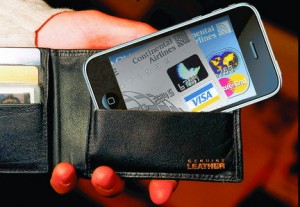 NEWS
NEWS
 NEWS
NEWS
 NEWS
NEWS
![]() Mobile payments spread the promise of wallet elimination, ridding credit cards of mantras that remind us to never leave home without it–and its contents. But the matter of how mobile payments will actually play out is a story of industry exploration that wades through consumer security, regulated standards and market demands, all balanced on the confidence of new technology.
Mobile payments spread the promise of wallet elimination, ridding credit cards of mantras that remind us to never leave home without it–and its contents. But the matter of how mobile payments will actually play out is a story of industry exploration that wades through consumer security, regulated standards and market demands, all balanced on the confidence of new technology.
The security aspect of mobile payments has taken a front seat, with the recent accusations against popular mobile app Square, while industry giants like Google are pushing ahead with NFC testing. This is all driving experimentation and adoption trends for mobile payment practices, but there are still a number of questions and concerns to address when it comes to consumer safety and security.
Square has staunchly defended its technology and application in the face of competitors like VeriFone, with CEO Jack Dorsey, also a co-founder of Twitter, insisting that the recent accusations overlook “all of the protections already built into your credit card.” While Square’s patent and accompanying credit card swipe are under investigation, Dorsey leaves the responsibility to the financial institutions that have built in consumer protection against fraud, which has been around for far longer than his latest startup.
But ROAM Data VP of Marketing Rob Stringer still sees a number of issues Square faces as it moves forward. “Jack Dorsey made a direct-to-consumer product without fully understanding the mobile payments industry,” Stringer tells me during a brief chat last week. “The beauty of Square is also it’s downfall. Riding the trust wave under Dorsey’s cape and the level of comfort he’s created with Twitter, we’re concerned about that because any drop in mobile security hurts the entire industry.”
![]() Encryption lies at the heart of Square’s remaining issues, as well as the solution Roam Data provides. Having already its company in the mobile industry, Roam Data went to its clients and partners first, assessing their needs around mobile payments integration tools. Encryption was a top response across the board, and has since become popular within its company.
Encryption lies at the heart of Square’s remaining issues, as well as the solution Roam Data provides. Having already its company in the mobile industry, Roam Data went to its clients and partners first, assessing their needs around mobile payments integration tools. Encryption was a top response across the board, and has since become popular within its company.
With ROAMpay, the swipe device fits into your smartphone’s headset jack, similar to Square’s. But it features a secure, encrypted reader that prevents skimmers from accessing personal data during the transaction. Converting your cell phone into a secure POS terminal, ROAMpay is the company’s flagship product, targeting merchants that want to expand their payment capabilities. It supports major credits cards like Visa, Mastercard, Discover and AmEx, and also supports key-in or swipe transactions on your mobile or PC.
With mobile payments expected to cross the 375 million mark by 2015, it’s no wonder credit card companies, established mobile companies and startups are interested in this space. It presents a market opportunity that vastly extends a merchant’s ability to generate revenue, and eases consumer interaction in a hyper-localized manner. And it’s companies like Square that are itching to own as much market share in this fresh territory, as quickly as possible.
Smaller companies are moving ahead of larger companies like Google and Apple, and while this is ground-breaking excitement, it also brings a bout of security risks. A recent report from GigaOm (subscription required) looks at the deluge of apps entering the mobile payments space, noting their importance in the emerging field. But consumer value is still of highest importance here, even as NFC standards and swipe technology appeal to the instant-gratification expectations of today’s consumer.
As with other technology-driven products that see reliatively rapid consumer adoption, basic principles must be established, and regulations eventually laid into law. The revolutionary take on mobile payments is an attractive means of eliminating the middlemen, but those middle men are there for a reason, Stringer continues. “What Square has done by mass producing these readers is introduced a variable with unforeseen circumstances.”
Roam maintains its security stance through its company history, and its closely-kept partner relationships. Teaming with Intuit, Chase and others, Roam offers a secure option that’s still low in cost for merchants. They don’t see themselves as Square’s competition, as they don’t target the consumer directly. But Roam is working towards establishing standards as the partner level, even offering to extend its supplier services to Square. They have yet to accept Roam’s offer.
But that doesn’t mean Square couldn’t eventually become more competitive with Roam, should they develop a platform similiar to ROAMpay or find better methods towards encrypting mobile payments. To this end, Roam’s working on its own intellectual property patents, holding the IPE for its related products.
THANK YOU